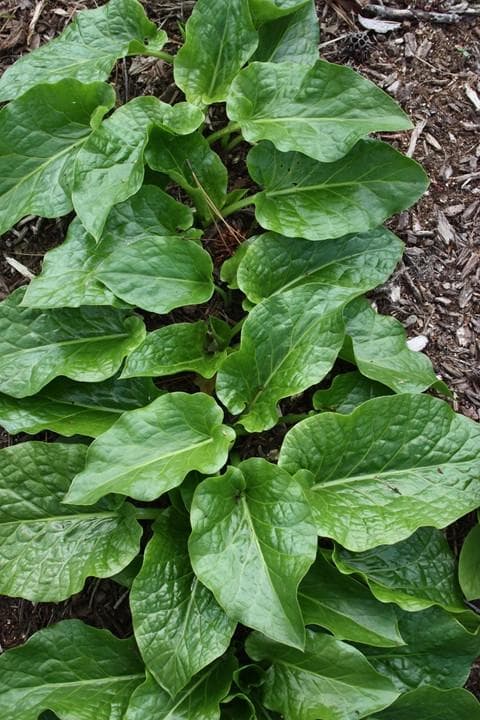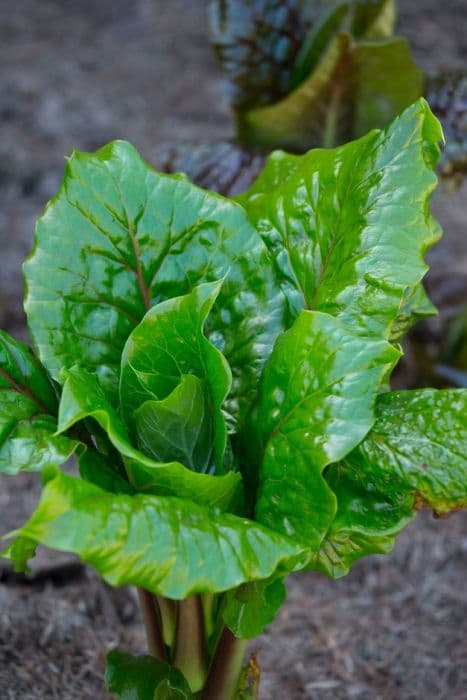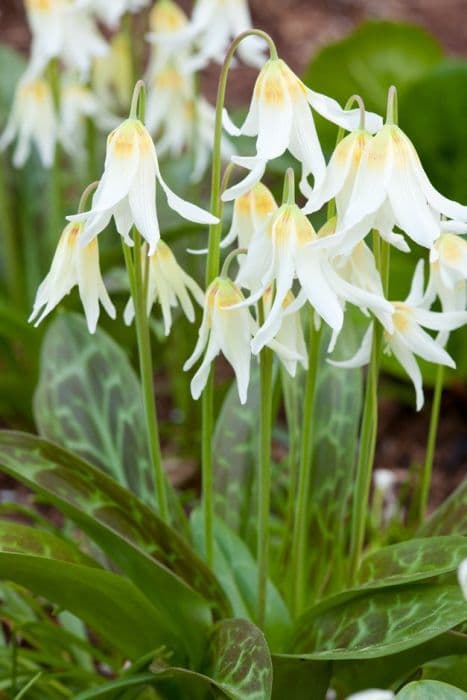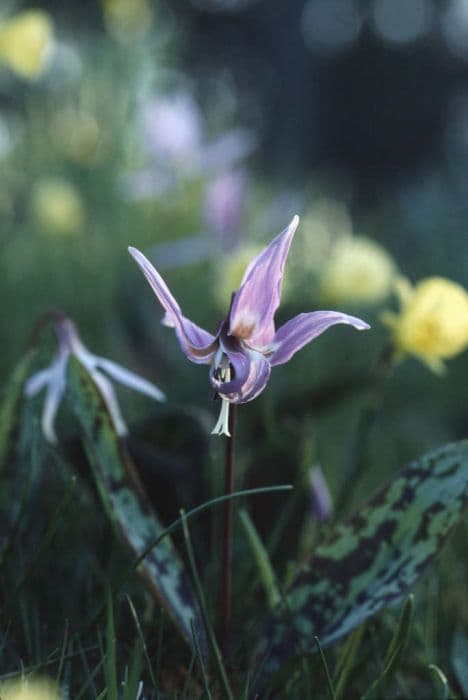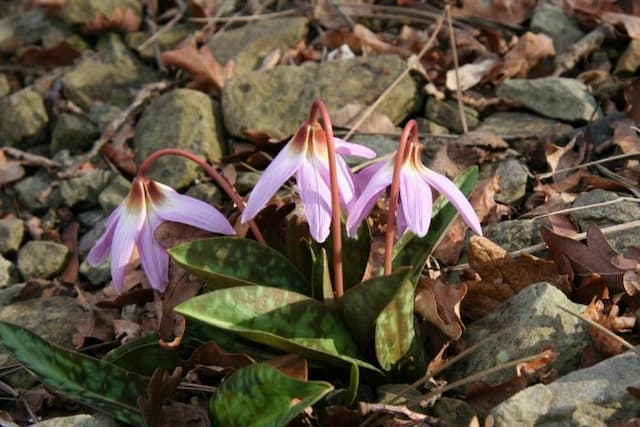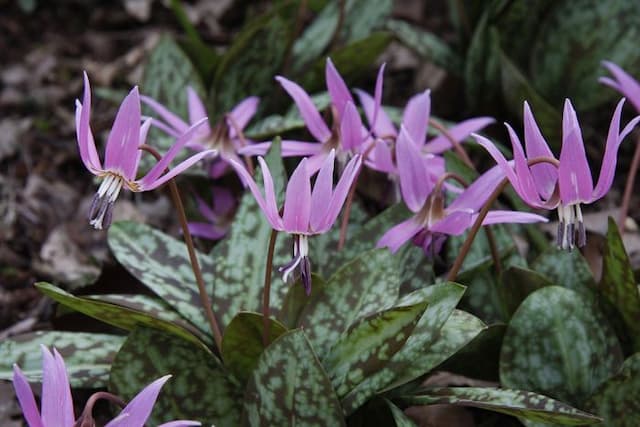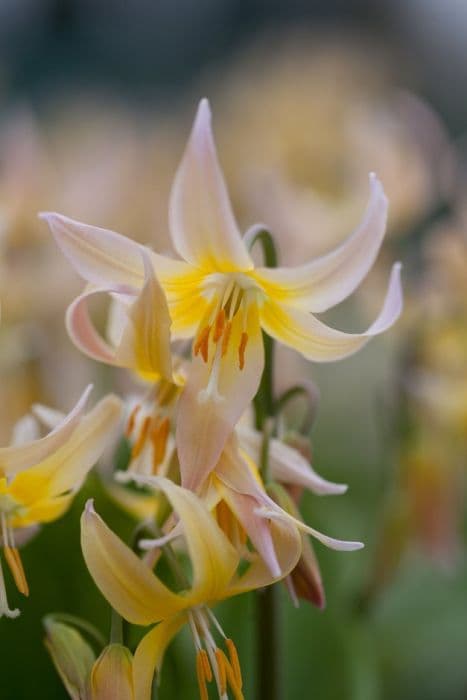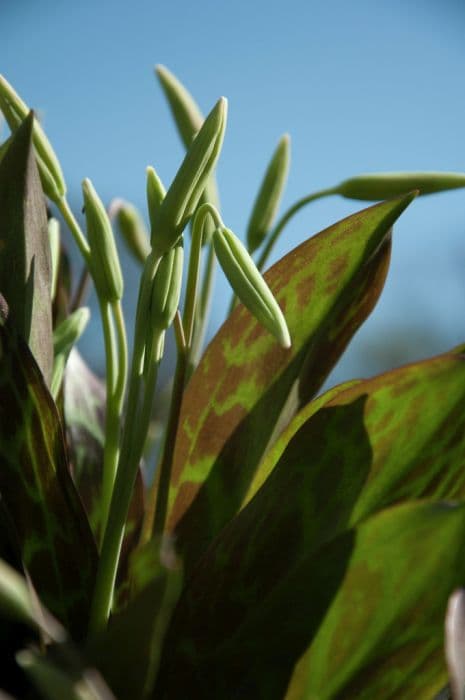Tulip Tulipa 'Affaire' (3)

ABOUT
Tulipa 'Affaire' is a tulip variety distinguished by its elegant and sophisticated blooms. The flowers of this plant are particularly eye-catching, with a classic cup-shaped profile that often characterizes tulips. The petals are smooth and exhibit a rich, creamy white color that can appear almost luminous in sunlight. The exterior of the petals may show hints of a soft green or yellowish base, which adds to the depth and complexity of the flower's overall appearance. The inside of the tulip's petals may be adorned with a yellow base, and typically, there are six petals forming each bloom. The stamens inside the flower are generally yellow, creating a charming contrast against the creamy white petals. This tulip variety has upright stems that showcase the flowers prominently, and the foliage is usually a vibrant green color that forms a complementary backdrop for the flowers. The leaves are narrow, elongated, and have a slightly wavy or smooth edge, showcasing a dense, rich green color that contrasts beautifully with the purity of the blooms. The overall look of the Tulipa 'Affaire' plant is one of refined beauty with an emphasis on the stunning flowers that captivate the attention of any onlooker during its blooming season. This tulip variety is often used in gardens and floral arrangements to add a touch of elegance and simplistic grace.
About this plant
 Names
NamesFamily
Liliaceae
Synonyms
Tulip, Affaire Tulip
Common names
Tulipa 'Affaire'
 Toxicity
ToxicityTo humans
Tulips are generally not considered highly toxic to humans. However, ingesting any part of a tulip may cause nausea, vomiting, and diarrhea. In particular, the bulb of the plant, which stores the highest concentration of chemicals, can cause symptoms of poisoning if consumed in large quantities.
To pets
Tulips are toxic to pets, particularly dogs and cats. If a pet ingests part of a tulip, especially the bulb, they can experience symptoms like vomiting, diarrhea, drooling, or even depression of the central nervous system. The plant contains compounds such as lactones and alkaloids that can cause these adverse reactions. In severe cases, ingestion may lead to more serious symptoms or complications, so if you suspect your pet has consumed tulip plant material, it is important to contact a veterinarian promptly.
 Characteristics
CharacteristicsLife cycle
Perennials
Foliage type
Deciduous
Color of leaves
Green
Flower color
Purple
Height
1-2 feet (30-60 cm)
Spread
0-1 feet (0-30 cm)
Plant type
Bulb
Hardiness zones
3
Native area
Central Asia
Benefits
 General Benefits
General Benefits- Ornamental Appeal: Adds aesthetic value to gardens with its striking flowers and vibrant colors.
- Seasonal Interest: Blooms in spring, providing seasonal charm and color after winter.
- Pollinator Attraction: Attracts bees and other beneficial pollinators, supporting local ecosystems.
- Versatility: Suitable for planting in borders, pots, and as cut flowers for indoor decoration.
- Low Maintenance: Once established, requires minimal care, making it suitable for novice gardeners.
- Diversity: Can be combined with other plants to create dynamic and varied garden designs.
 Medical Properties
Medical PropertiesThis plant is not used for medical purposes.
 Air-purifying Qualities
Air-purifying QualitiesThis plant is not specifically known for air purifying qualities.
 Other Uses
Other Uses- Tulip petals can be used as a natural fabric dye, with 'Affaire' tulips possibly providing a unique color due to their specific pigmentation.
- The sturdy stems of tulips can be used in arts and crafts for creating floral arrangements or for support in small, delicate handiwork projects.
- 'Affaire' bulbs can be refrigerated and given as gifts to gardening enthusiasts to plant in their own gardens.
- Pressed 'Affaire' tulip petals can be used in scrapbooking or card making for a delicate, floral touch.
- Whole tulip plants, including 'Affaire', can be potted and used as a natural method to indicate soil moisture levels, as the plant will wilt when lacking water.
- Dried tulip petals can be used in potpourri mixes to provide subtle fragrance and decorative elements.
- Tulip flowers can be used in photography as a subject for practicing macro photography techniques, owing to their intricate details and vibrant colors.
- The vibrant 'Affaire' tulip petals can be used as a natural food coloring in pastries and desserts for an added visual appeal.
- Tulip bulbs are sometimes used in a practice known as "forcing," which tricks the bulbs into blooming early when grown indoors under controlled conditions.
- Petal of 'Affaire' can also be used in homemade beauty treatments, such as natural face masks, due to their gentle properties and soft texture.
Interesting Facts
 Feng Shui
Feng ShuiThe Tulip is not specifically used in Feng Shui practice.
 Zodiac Sign Compitability
Zodiac Sign CompitabilityThe Tulip is not used in astrology practice.
 Plant Symbolism
Plant Symbolism- Perfect Love: The Tulip, in general, symbolizes perfect love and is often associated with the concept due to its lush and beautiful nature. The 'Affaire' variety, with its strong and bold appearance, continues to represent the strength and beauty of love.
- Declaration of Love: Giving someone a Tulip is a way to declare one's love in the language of flowers. Each color may carry a more specific message. For example, red Tulips are most strongly associated with true love, while purple symbolizes royalty and adoration.
- Royalty and Nobility: The rich and vibrant colors of the Tulip, along with its majestic stature, often link it to nobility and a regal presence; 'Affaire', with its striking appearance, fits this symbolism aptly.
- Rebirth and Renewal: As Tulips are some of the first flowers to bloom in the spring, they have become emblematic of new beginnings and the renewal that comes with the season.
 Water
WaterThe Tulip 'Affaire' requires consistent moisture during its growing season. Water thoroughly when the soil feels dry to the touch, about an inch below the surface. On average, this may mean watering once a week, but frequency should be adjusted depending on rainfall and temperature conditions. Provide about a gallon of water per square yard of soil, ensuring even distribution around the plants. During the dormant period after the foliage has died back, reduce watering significantly to prevent bulb rot.
 Light
LightThe Tulip 'Affaire' thrives in full sunlight, so it's best to plant it in a location where it will receive at least 6 hours of direct sunlight each day. Partially shaded spots can also be suitable, but the flowers may not bloom as prolifically. Ensure that no tall plants or structures cast excessive shade on the tulips during the prime daylight hours.
 Temperature
TemperatureTulip 'Affaire' prefers a temperate climate with a pronounced chilling period which is crucial for bulb development. They can survive winter temperatures down to 14 degrees Fahrenheit and in the growing season can handle temperatures up to 70 degrees Fahrenheit. Ideally, during the growth and bloom stages, keep the tulips in an environment where average temperatures hover between 55 and 65 degrees Fahrenheit.
 Pruning
PruningPruning Tulip 'Affaire' primarily involves deadheading spent flowers to encourage bulb strength. After the blossoms fade, cut back the flower stalks but leave the foliage in place until it turns yellow and dies back naturally. This typically occurs only once a year, usually in late spring to early summer, depending on your climate.
 Cleaning
CleaningAs needed
 Soil
SoilTulip 'Affaire' prefers well-draining, fertile soil with a neutral to slightly acidic pH of 6.0 to 7.0. A mixture of loamy soil with added compost and a bit of sand for improved drainage is ideal. Ensure that the soil is not too wet as this can cause bulb rot.
 Repotting
RepottingRepotting is not a common practice for Tulip 'Affaire' as it is typically grown as an annual from bulbs. Instead, plant new bulbs each autumn for blooming in spring. If grown in containers, they can be lifted and stored dry after foliage dies back and replanted in the fall.
 Humidity & Misting
Humidity & MistingTulip 'Affaire' is tolerant of a range of humidity levels and does not require specific humidity conditions. These tulips are more concerned with proper soil moisture levels than atmospheric humidity. Outdoor humidity levels are generally adequate for their growth.
 Suitable locations
Suitable locationsIndoor
Plant bulbs in fall, place in a cool, sunny spot, water moderately.
Outdoor
Plant bulbs 4-6 in. deep in fall, full sun or part shade.
Hardiness zone
3-8 USDA
 Life cycle
Life cycleThe life of a Tulip 'Affaire' begins with the planting of the bulb in autumn, as the cold period is essential for the bulb to develop a strong root system. During the cold winter months, the bulb remains dormant underground. With the arrival of spring, warmer temperatures and increased daylight stimulate the bulb to produce a stem, leaves, and eventually a flower, typically in mid to late spring. After blooming, the flower wilts and the plant enters a period of energy absorption, where the leaves photosynthesize to replenish the bulb's energy reserves. Once the foliage has died back in early summer, the bulb enters a dormant phase again, until the cycle restarts with the next growing season. During the dormant period, it's essential to avoid watering the bulb excessively to prevent rot.
 Propogation
PropogationPropogation time
Spring
The most popular method of propagating Tulipa 'Affaire', commonly known as the tulip, is by separating and planting its bulbs. The ideal time for this process is in the fall, just as the temperature starts to cool but before the ground freezes. To propagate, carefully dig up the tulip bulbs after the foliage has died back and the plant is dormant, usually late summer. Gently separate the smaller daughter bulbs from the parent bulb, taking care not to damage the roots or the basal plate from where new shoots emerge. Plant these bulbs about 6 to 8 inches (15 to 20 centimeters) deep, with the pointed end facing upward, and space them approximately 4 to 6 inches (10 to 15 centimeters) apart in well-draining soil with adequate sunlight. Water the newly planted bulbs thoroughly to establish their roots before the onset of winter. By the following spring, these bulbs should produce new tulip plants that will continue to mature and potentially produce their own offsets in subsequent years.
